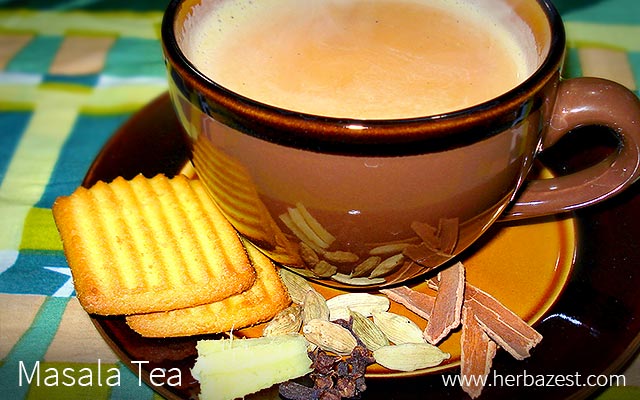An aromatic cup of masala tea can surely be a memorable experience. This milky black tea beverage, flavored with a mixture of warming spices, has made its way from the street vendors in India to the coffee and tea shops around the world. Besides its delicious taste, masala tea also offers a great variety of health benefits.
History of Masala Tea
Despite many legends about the invention of masala tea, it is certain that this tradition has begun in India, where it was called masala chai. The term chai, which literally means 'tea,' is commonly used today in the West to signify masala tea; whereas, masala is the blend of spices used for its flavoring.
It is believed that a mixture of milk and masala spices has been used for thousands of years, but the final addition of black tea did not occur until the 1830s, during the British rule of India. However, other sources claim that this spiced tea has been enjoyed long before their arrival.
Interestingly, the popularity of masala chai has led to the creation of another beverage, called dirty chai, which is made by adding a shot of espresso to masala tea. The masala spices, being so warming and fragrant, are often used in baking to make pumpkin pie or other baked goods.
Benefits of Masala Tea
Traditionally, masala tea has been consumed for its health benefits due to the medicinal properties of black tea and the herbal blend. It is said that the composition of masala has its roots in Ayurveda, the ancient medicinal system whose practices are still popular today.
In the Western world, masala tea is a mostly drank as a recreational drink, and many people are not aware of its health benefits. Black tea has been recognized for improving blood flow in the arteries and increasing alertness, while the spices, as they are boiled, release their aroma and infuse the liquid with their goodness.
Ginger, for example, is known to improve immunity and fight colds, while cinnamon alleviates the symptoms of sinus congestion, enhances digestive function, and helps lowering blood sugar. Fennel, on the other hand, is used in managing hypertension and relieving digestive problems, similarly to black pepper and cloves, which are also known pain relievers.
However, as research suggests, addition of milk to tea may diminish the action of catechins, which are the compounds found in tea leaves and associated with the health benefits of tea.
Masala Tea Recipe
Local customs, personal preferences, and the expansion of masala tea's popularity have contributed to a wide range of variations of original masala tea recipe. Many families in India take huge pride in their recipe, and pass it down to the next generations.
Making masala tea at home is easy and affordable, and it traditionally involves boiling water and milk, with loose black tea leaves and a variety of spices. Nowadays, however, it is common to find masala tea in the form of tea bags, syrup concentrates, or instant powdered mixtures.
The basic ingredients for a good masala tea include:
- 1 tea bag or one tablespoon of loose leaf black tea
- 1 cup of milk
- 1 cup of water
- Sugar to taste
- 1 tablespoon of spices (at least ginger and cardamom)
This basic recipe can be modified according to personal taste with other spices, such as cinnamon, anise, fennel, black pepper, nutmeg, and cloves. Whole spices are preferred as they release the most intense aroma. They can be lightly toasted and roughly crushed prior to being added to the pot. Sugar can be omitted or replaced with honey, brown sugar, and coconut sugar, but the addition of a sweetener is recommended as it enhances the flavor of the spices. Occasionally, green tea is used instead of black tea and other flavorings, such as almonds, saffron, or coriander, are added.
The preparation takes only a few minutes: spices along with milk and water are brought to a boil in a pot, then reduced to simmer. Next, loose tea leaves or a tea bag are immersed in the liquid and simmered for five minutes. Finally, sugar is added, and the mixture is ready to be strained and served. The final cup of masala tea can be garnished with ground cinnamon or nuts, such a pistachios or almonds.
Where to Buy Masala Tea
The individual ingredients to make masala tea at home are easily accessible virtually everywhere, and home brewing is generally a good money-saving practice. Pre-made masala chai mixes, which are popular and widely available in herbal stores and online, contain all the necessary ingredients and only require the addition of water. However, caution is advised as some of them contain large amounts of sugar or corn syrup. Additionally, many coffee and tea shops around the world offer masala chai, especially during autumn and winter.




